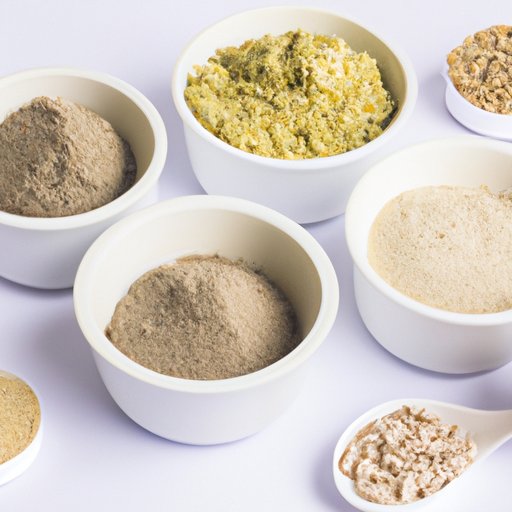
Introduction
Many people struggle with gaining weight, whether it’s for health or fitness reasons. One of the most important factors in building muscle and gaining weight is protein intake. In this article, we will cover everything you need to know about how much protein you need to gain weight and the best sources of protein to incorporate into your diet.
Benefits of Protein for Weight Gain
Protein is essential for building and repairing muscle tissue, which is necessary for weight gain. Additionally, a high-protein diet has been shown to improve satiety, making it easier to stick to a calorie surplus necessary for weight gain. Furthermore, consuming protein after exercise improves muscle recovery and can help increase muscle strength.
How Much Protein Is Needed for Weight Gain
For those looking to gain weight, it is recommended to consume between 1.2-1.7 grams of protein per kilogram of body weight. This range accounts for differences in activity levels and can help ensure optimal muscle protein synthesis. Furthermore, it’s important to distribute protein intake evenly throughout the day, with a minimum of 20-30 grams of protein consumed per meal.
The Best Protein Sources for Gaining Weight
Animal-based sources of protein like beef, chicken, fish, and eggs are great options for those looking to gain weight as they are rich in protein and other essential nutrients. Plant-based sources like legumes, nuts, and seeds are also great options, as they are high in both protein and fiber.
Here are some of the best protein sources for gaining weight:
- Beef
- Chicken
- Turkey
- Fish
- Eggs
- Milk
- Cottage Cheese
- Yogurt
- Tofu
- Lentils
- Black Beans
- Quinoa
- Almonds
- Peanut Butter
Protein Timing for Weight Gain
Timing protein intake can help optimize muscle protein synthesis and recovery. It is best to consume protein at regular intervals throughout the day, with a focus on consuming protein before and after exercise. Consuming protein before exercise can help boost performance, while consuming protein after exercise can help with muscle recovery and growth. Additionally, make sure to include protein in every meal and snack to support muscle growth and repair.
Balancing Macronutrients for Weight Gain
Protein is important for building muscle, but carbohydrates and fats are also essential for gaining weight. Carbohydrates are necessary for energy, while fats are necessary for hormone production. For optimal results, it’s important to balance your intake of carbohydrates, fats, and protein. Aim for a diet consisting of 40% carbohydrates, 30% protein, and 30% fat.
Special Considerations for Vegetarians and Vegans
Vegetarians and vegans can still consume enough protein for weight gain by incorporating plant-based protein sources like tofu, legumes, nuts, and seeds. However, it may be necessary to consume a slightly higher amount of protein to account for reduced protein quality in plant-based sources. Aiming for 1.7-2.2 grams of protein per kilogram of body weight can help ensure optimal muscle protein synthesis.
The Role of Supplements for Weight Gain
Protein supplements like whey protein and casein can be useful for those who struggle to meet their protein needs through whole foods. These supplements are convenient and easy to consume, providing a high-quality source of protein. However, it’s important to remember that supplements are just that – supplements. They should not replace whole foods in the diet.
Conclusion
In conclusion, protein intake is essential for weight gain and muscle building. Consuming enough protein, timing protein intake, and balancing macronutrients can all help optimize muscle protein synthesis and support weight gain efforts. Experimenting with different protein sources and intake strategies can help individuals find what works best for their unique needs and preferences.





